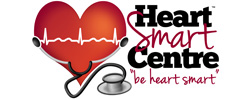Getting to know your heart
Welcome to the first in the series Heart Smart Talk. Over upcoming weeks, we will be looking at different aspects of heart disease. We will begin by looking at the symptoms of heart disease, and then look at specific heart conditions. We also welcome your questions, and will try our best to address them in the series.
The heart is an essential or vital organ, without which our bodies cannot function. Where as our bodies can function while brain dead, or with one kidney or one lung, the body cannot function without the heart. It is therefore the most important organ in our body and should be treated with the utmost care and respect.
The heart is a muscular pump, and its main function is to pump blood around the body. The left heart receives blood from the lungs that is now filled with oxygen and then pumps it to all of the body’s organs. Blood has essential nutrients and oxygen that are needed for proper function of all of the body’s organs. When our organs have used up all the oxygen and nutrients in blood, the blood that has no oxygen is returned to the right side of the heart. The right heart pumps blood to the lungs, so that it can get oxygen and then the cycle repeats itself. The entire cycle takes a few seconds, pumping 4-6L of blood with each cycle.
Heart disease occurs when ever any the components of the heart is damaged, and is unable to perform its proper function. Heart disease may be congenital or acquired. Congenital heart disease includes meaning defects that are consequence of abnormal formation of the heart during the fetal stages. These diseases are therefore usually manifested early, either in newborn or childhood. Rarely, they become apparent for the first time in later life, like the second or third decade. These are usually managed by a Pediatric Cardiologist, who sees persons with heart disease from birth to age 18 years, and sometimes beyond.
Acquired heart disease includes any condition that is a consequence of our lifestyle such as coronary heart disease, hypertensive heart disease. In our population in Jamaica, hypertensive heart disease is one of the most common acquired heart diseases stemming from poor control of hypertension. Hypertension often produces no symptoms, while causing heart damage, kidney damage, eye damage – silently. Hence its moniker (The silent killer).
In the next installment, we will explore “How do I know I have heart disease”, that is we will take some time to explore the symptoms of heart disease.


Pingback: Adult dating site
Pingback: purchase hydroxychloroquine 200mg online
Pingback: hydroxychloroquine reviews
Pingback: hydroxychloroquine drops
Pingback: tetracycline misuse in the 60s
Pingback: hydroxychloroquine coupons
Pingback: azithromycin dosing
Pingback: real ivermectil fast shipping
Pingback: prednisone 10mg 48 pack directions
Pingback: does priligy work
Pingback: stromectol empty stomach
Pingback: buy ivermectin no prescription
Pingback: dapoxetine for ed
Pingback: prednisone without prescription
Pingback: acyclovir 800 mg tablet price
Pingback: how to store ivermectin suspension before reconstitution
Pingback: best time to take stromectol
Pingback: cheap generic ivermectin
Pingback: buy stromectol for dogs canada
Pingback: ivermectin 1% solution
Pingback: ivermectin tablets 6 mg
Pingback: cialis online with no prescription
Pingback: dose of ivermectin for a man
Pingback: cialis tab price
Pingback: australian shepherd ivermectin toxicity
Pingback: clomiphene dosage for men with low testosterone
Pingback: where is ivermectin available
Pingback: oral ivermectin lice
Pingback: viagra 12.5 mg
Pingback: where can i find viagra
Pingback: walgreens pharmacy drive through hours
Pingback: cialis prescription australia
Pingback: hydroxychloroquine for sale in canada
Pingback: sildenafil over the counter india
Pingback: sklice and stromectol for sale
Pingback: canadian pharmacy generic tadalafil
Pingback: buy viagra over the counter in australia
Pingback: contador de dias